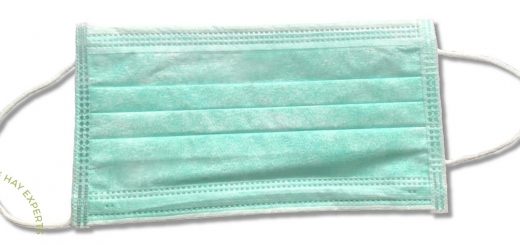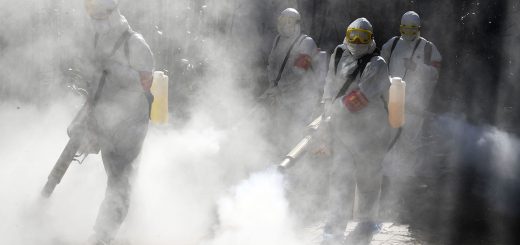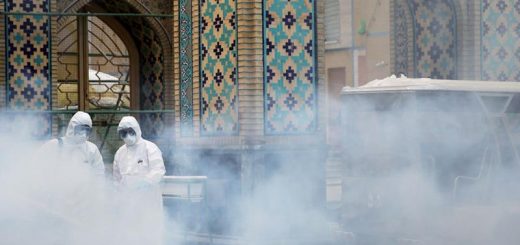QUESTION:
What do the scholars of the Dīn and muftīs of the Sacred Law state regarding the following issue: Doctors are advising us to use alcoholic hand sanitisers in order to avoid & protect us from the Coronavirus, even though they contain alcohol – albeit a small amount – so what is the ruling regarding this?
Questioner: Mawlānā Usman from Bradford, England
ANSWER:
[IF YOU HAVE ANY EXISTING MEDICAL CONDITIONS, OR ARE SHOWING ANY SYMPTOMS FOR THE CORONAVIRUS, OR ARE ABOVE 60 YEARS OF AGE, OR ARE IN ANY OF THE HIGH RISK CATEGORIES THEN STAY AWAY FROM THE MOSQUE OR ANY PUBLIC PLACE AND FOLLOW THE GUIDANCE GIVEN BY THE MEDICAL EXPERTS AND THE UK GOVERNMENT – please see https://www.nhs.uk/conditions/coronavirus-covid-19/]
بسم اللہ الرحمن الرحیم
الجواب بعون الملک الوھاب اللھم ھدایۃ الحق والصواب
The usage of hand sanitisers & hand wash is permissible because they contain ethanol i.e. such alcohol which is not made from grape; rather, it is made from wheat and other products similar to this. Also, a minute amount of such alcohols which are not an intoxicant are pure & Halāl [lawful] according to Imām A’zham Abū Hanīfah & Imām Abū Yūsuf. Therefore, it is permissible according to the Shaykhayn [i.e. the two aforementioned Imāms] to use those products which contain such a small amount (which does not reach the level of intoxication). However, it is impermissible according to Imām Muhammad because according to him, any type of alcohol – be it a small amount or large amount – is impure & Harām [unlawful]. The legal verdict is issued according to this stance, however, if ‘Umūm Balwā[1] comes about in the usage of these products – in the sense that every person becomes involved in this and it affects everybody – so then it is correct to issue the legal verdict according to the stance of the Shaykhayn and act upon their stance.
Just as I have already issued a researched legal verdict three years ago with regards to common drinks and general cleaning products in the U.K. which is online on the SeekersPath website in both the English and the Urdu language. At that time, many scholars feared my authentication, however, today they can all be seen to be in agreement with it.
A’lāhadrat Imām Ahmad Ridā Khān, upon whom be infinite mercy, himself issued the legal verdict of coloured packets/parcels (which are made from spirit alcohol) being pure i.e. issued the legal verdict according to the stance of the Shaykhayn.
Just as he states, that there is no harm (in terms of Islamic Law) for people with regards to coloured parcels/packets [made from alcohol], and to refrain from [these kinds of] coloured packets/parcels out of the fear of Allāh is better. Even then, nowadays to issue the legal verdict of salāh not being valid is a cause of extreme difficulty.
“والحرج مدفوع بالنص وعموم البلوی من موجبات التخفیف لاسیما فی مسائل الطھارۃ والنجاسۃ”
“It is proven from textual evidence [Qur’ān & Sunnah] that difficulty should be removed, and ‘Umūm Balwā is amongst the causes of lightening the ruling, especially in regards to matters of purity & impurity.”
Therefore, in this issue & matter, there is no reason to turn away from the school of thought of Imām A’zham Abū Hanīfah & Imām Abū Yūsuf, may Allāh Almighty be pleased with them both; salāh is permissible without a doubt with regards to coloured packets/parcels according to our Imāms. I prefer to issue the legal verdict upon this in these times.
[Fatāwā Ridawiyyah, vol 6, pg 390]
The stance of the Shaykhayn is of that which was the stance of many of the Blessed Companions, and it is this which is the preferred opinion according to the reliable & trustworthy scholars of the Ummah, to the extent that this is also a narration from Imām Muhammad. This issue was differed over amongst the Blessed Companions, and the reason for turning away from the stance of the Shaykhayn and issuing the legal verdict according to the stance of Imām Muhammad is not found here, so then why would one turn away from the stance of the Shaykhayn? Why should Muslims be placed in difficulty & hardship by leaving the actual founder of the school of thought of the religion [of Islām] for no reason, and say that hand sanitisers and other similar products (whose usage has become extremely common) are impure?
Just as Imām Ahmad Ridā Khān, upon whom be mercy, states that there is much to say for this servant [humbly referring to himself] with regards to issuing the legal verdict of packets/parcels being impure. Its summary is that even if it is established per Islamic Law that there is alcohol in the [making of] packets/parcels, then there is no doubt that Hindūs dyeing/colouring them is extremely common, and ‘Umūm Balwā[2] in regards to something which is unanimously agreed as impure is a cause of lightening the rule.
“حتی فی موضع النص القطعی کمافی ترشش البول قدرؤس الابرکما حققہ المحقق علی الاطلاق فی فتح القدیر”
“Up to the extent it is in definitive textual evidence, just as sprinkles of urine equal to the size of a pinprick (are a cause of lightening the rule), just as the unanimously agreed researcher has researched in Fat’h al-Qadīr.”
Not in the place of difference of opinion, whereby there was an equal difference of opinion from the time of the Blessed Companions until the era of the Muhājirīn[3]. Nor where the actual stance of the founder of the school of thought – Imām A’zham – and Imām Abū Yūsuf being pure, and it is this which is one narration from the third Imām – Imām Muhammad. It is this which Imām Tahāwī, and the other Imāms who are authorised to prefer stances & verify have kept as preferred and chosen. Nor in such conditions for such advice to come in which the latter of those who [are able to and] issue legal verdicts to turn away from the founder of the [Hanafī] school of thought of the religion [of Islām], and is a cause & reason for accepting the other stance of Imām Muhammad. Nor when leaving contrary advice and there being anything driving towards issuing the legal verdict of the actual stance, then in such a place, without doubt – rather, without a reason – leaving the stance of the founder of the school of thought, and placing Muslims in difficulty & hardship, and – God forbid – regarding the salāh of the general Muslim men & women, of all the regions, provinces & districts of India as invalid, and regarding them as sinful perpetrators of major sins (sinful and insistency in major sin) is extreme meddling from an Islamic Jurisprudential point of view.
[Fatāwā Ridawiyyah, vol 6, pg 381]
The Imām of the Ahl al-Sunnah, Imām Ahmad Ridā Khān, explaining the original & actual school of thought in essence and its strength, states that the original stance is the stance of the Shaykhayn, may Allāh Almighty be pleased with them both,
“اعنی طھارۃ المثلث العنبی والمطبوخ التمری والزبیبی وسائر الاشربۃ من غیرالکرم والنخلۃ مطلقا وحلھا کلھا دون قدر الاسکار”
“I mean the plant related alcohol being pure for which 2/3 of it has dried. For example, that of dates, and raisins, which has been brewed, and all alcohols other than that of grapes and dates being pure, and them being Halāl, provided that they are below the level of intoxication.”
Far be it from this stance being out of use & invalid! No; rather, it is very strong. This is the actual school of thought itself, and this being narrated by the majority of the Blessed Companions, to the extent of the respected People of Badr, may Allāh Almighty be pleased with them, it is this which is the stance of Imām A’zham, the stance of the common mutūn[4]; for instance, Mukhtasar al-Qudūrī, al-Hidāyah, Wiqāyah, Nuqāyah, Kanz, Ghurar, Islāh, etc settled upon this. Senior Imāms who are authorised to prefer stances and validate; for example, the grand Imām Abū Ja’far Tahāwī, the great Imām Abū al-Hasan Karkhī, Imām & Shaykh of Islām Abū Bakr Khawāhir Zādah, the grand Imām Qādī Khān, the great Imām; the author of al-Hidāyah – may Allāh Almighty have mercy upon them all – have all kept this as preferred & chosen. Imām Muhammad himself issued the legal Islamic verdict in Kitāb al-Āthār, having said this to be what we take. The scholars of the [Hanafī] school of thought have verified & attested this in many reliable books, up to the extent that emphasised wording of preference – the Islamic legal verdict is issued according to this – has even been mentioned.
It is stated in Khizānah al-Muftiyīn that,
“فی الھدایۃ والنھایۃ وفتاوٰی قاضی خان وظھیرالدین والخلاصۃ وفتاوی الکبرٰی وفتاوی اھل سمرقند والحمیدی الاصح ماعلیہ ابوحنیفۃ وابویوسف رحمھما اﷲ تعالٰی”
“It is mentioned in al-Hidāyah, al-Nihāyah, Qādīkhān, Fatāwā Zhahīr al-Dīn, Khulāsah, Fatāwā Kubrā, Fatāwā Ahl Samarqand and al-Humaydī that what is most correct is that which Imām A’zham Abū Hanīfah & Imām Abū Yūsuf, mercy be upon them both, are upon [i.e. of the opinion of].
[Khizānah al-Muftiyīn, vol 1, pg 186]
[Fatāwā Ridawiyyah, vol 25, pg 115]
[1] Common difficulty – an unfavourable widespread situation affecting most people which is difficult to avoid.
[2] something being so extremely common, up to the extent that it is extremely difficult to avoid.
[3] Migrants from Makkah to Madīnah.
[4] fixed textual evidence & proof of the books of Fiqh [Islamic Jurisprudence & Law].
واللہ تعالی اعلم ورسولہ اعلم صلی اللہ علیہ وآلہ وسلم
کتبہ ابو الحسن محمد قاسم ضیاء قادری
Answered by Mufti Qasim Zia al-Qadri
Translated by Haider Ali
Read the original Urdu answer here: [Q-ID0782] Can we use hand sanitisers that contain alcohol to protect us against Coronavirus [COVID-19]?
Click here to download the Fatwa by Darul Ifta UK (Urdu) on this topic.
PLEASE NOTE: That there other Scholars who state that using hand sanitisers that contain alcohol is impermissible – please see the following answer by Mufti Zahid Hussain – https://www.thesunniway.com/articles/item/321-is-it-halal-to-use-hand-sanitisers-containing-alcohol
Also see:
[Q-ID0780] Should the Mosques be closed due to the outbreak of Coronavirus [COVID-19]?


















